theartsdesk Q&A: Actor Tom Hollander | reviews, news & interviews
theartsdesk Q&A: Actor Tom Hollander
theartsdesk Q&A: Actor Tom Hollander
The co-creator and star of Rev on the role of a lifetime
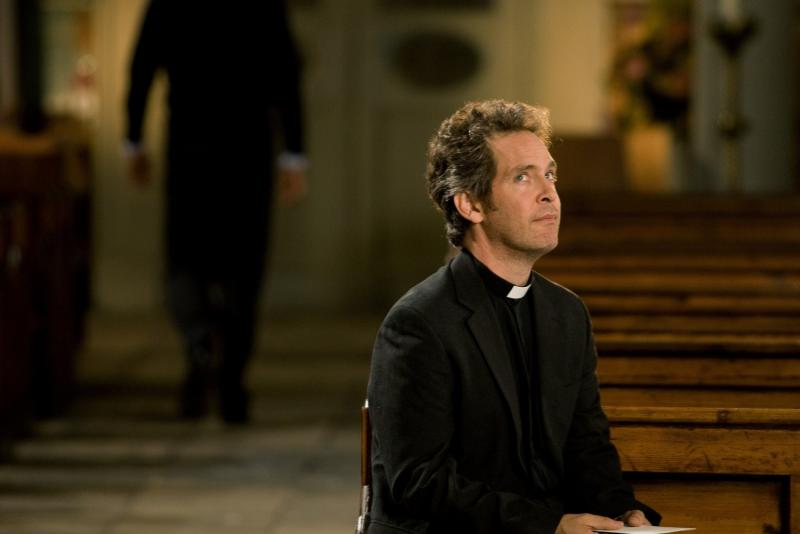
A few years ago something curious happened to Tom Hollander. He grew up. As a brilliant young actor he won the Sunday Times Ian Charleson Award for a series of stage performances whose governing tone was mercurial energy. But as he moved into film, the sense was of an actor who was more eager to be noticed than believed.
A thoroughly engaging sitcom, it stars Hollander as an inner-city vicar who each Sunday preaches to a thin congregation of low-lifes and losers. The Vicar of Dibley it very much isn’t. Adam is regularly squashed by the visiting archdeacon, hassled by indigent doorsteppers and thwarted in his efforts to get a sex life going with his eager wife (played by Olivia Colman). The role, which brings out persuasive new shades of watchfulness and decency, is a gift for Hollander 2.0. It’s a gift, it should be added, from himself. The idea for Rev, as he explains to theartsdesk, was the actor’s own, arising from whispers he heard on the west-London party circuit. He went to James Wood, who wrote Freezing, the (sadly shortlived) sitcom in which Hollander played a version of his own infamous agent.
It feels right that Hollander should have taken a more proactive role than an actor regularly would. In conversation he is extremely funny, mostly against himself. Belittling himself works physically, too. In one episode from the first series of Rev, Adam’s church was invaded by a charismatic priest who, as played by the lofty Darren Boyd, towered over Hollander. Not before time, Hollander is a giant in his first undisputed lead role in a television series. But for what insurers call an act of God, he should be in a dog collar for years to come. In this two-part interview - one half conducted before the first series, the other before the second - Hollander explains the gospel according to Rev.
REV: THE GENESIS (SERIES ONE)
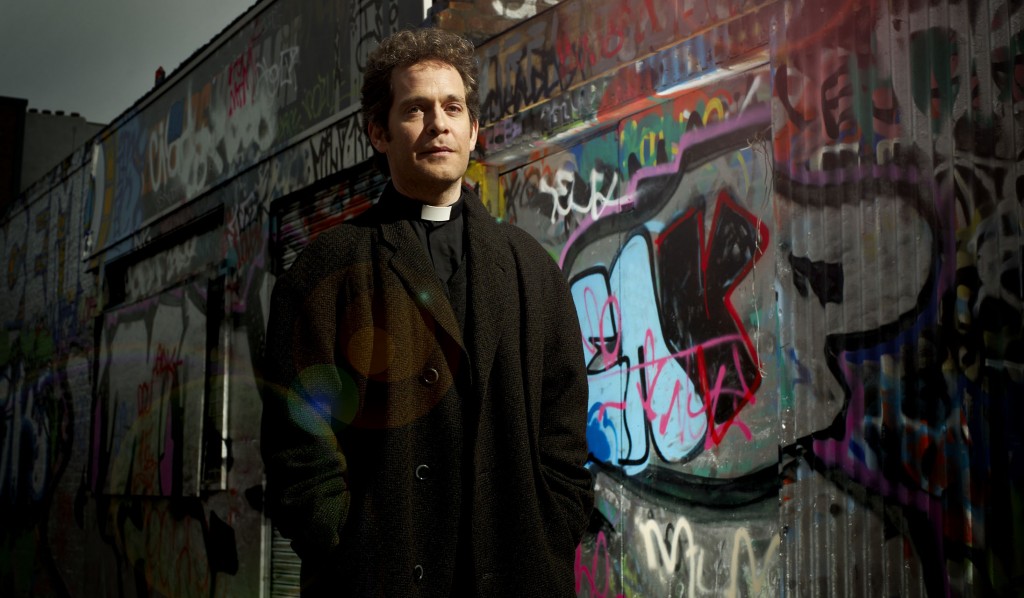 How did Rev start?
How did Rev start?
The genesis was an extremely enjoyable process, one that I’ve never been through before. Somebody told me a local bit of gossip about a local vicar in west London becoming hugely socially significant because members of the then Shadow Cabinet, now the ruling Cabinet, were trying to get their children into his school. He’d become west London’s most invited man. And that struck me as terribly amusing. I thought, how funny is that? The idea that an Anglican vicar who you might conventionally imagine to be a socially awkward and slightly excluded figure should become somebody that people are falling over themselves to...
And then also I went to the christening of a godchild of mine. As we were standing around the font the vicar was there and they were doing it very sweetly and there were these appallingly behaved children around him who were literally shouting and swearing, firing beanie guns at him, who turned out to be his own children. And then as we were standing there I looked at my old friend who I had been at university with, whose child I was becoming a godfather of, and suddenly I remembered him coming back from Christmas holidays rejoicing in the fact that he had finally once and for all disproved the existence of God for his mother, and he’d made her cry over Christmas lunch. And I thought, and here I am at the christening of your son. So what’s gone on? It turned out that his wife, very practical, wanted to get him into the school.
Those were little sparks, and then much more interestingly I then talked to James Wood about it. I said, “That’s quite funny, isn’t it?” And then we thought, maybe there’s a story to be written there. We had done Freezing together. I had enjoyed his writing and he likes my acting. And then we started researching it. I initially had more time so I went off and stayed for a couple of weekends with some vicars and talked to every vicar that I could meet, just anecdotally.
Clearly the Church of England still has a role in people's lives in all the major moments
Where did you go?
Boston, Lincolnshire, largely because there was a lovely man there who had married James. And also taught him at school. I knew another one, I suddenly realised, and I took him out to lunch. They in the main had already thought of the dramatic and comic possibilities of their own lives. So really I just learnt about it, got an instinct for their world and wrote down their anecdotes. And then we turned them into plots.
Did The Vicar of Dibley come up in conversation?
Initially not at all, until we started pitching it, and then clearly we had to define ourselves in relation to it and to every other vicar comedy that there’s ever been.
The key thing being that it’s set in an inner-city parish.
And I think crucially that it’s not a fictional idealised world of Old England. It’s supposed to be a complicated contemporary world full of the difficulties of the central-London life.
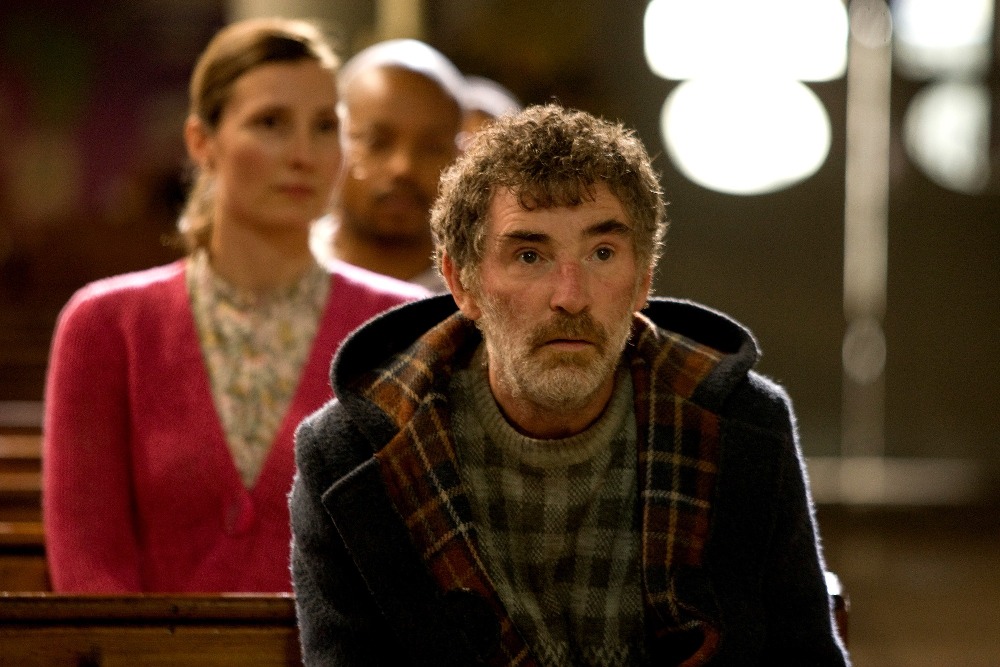 I love the idea of the archdeacon being obsessed with targets.
I love the idea of the archdeacon being obsessed with targets.
It was amusing, first of all, largely because archdeacons do have to do that. They have to spend their time going around making sure that the fabric of the church buildings and the situation all work. But him as a patrician cynic, in the scheme of the story I imagined Adam as a Guardian-reading liberal consensus right-thinking person with an inner Daily Mail reader. He knows the right thing to think. Colin (pictured left, Steve Evets) was any of the red tops but also the Socialist Worker. He’s a random stew of radical ideas, all of which are a foil to whatever plot you’re telling because he can get sucked up into them. The archdeacon is The Telegraph. He’s a pragmatic, cynical establishment. That politically is the spread of it.
Did you find such archetypes exist?
We’ve exaggerated him as an archdeacon. He’s probably more high-status in our fiction. He’s very lofty in his demeanour. He’s behaving like a bishop. There is a hasn’t-made-it-to-bishop syndrome with archdeacons which sometimes makes them quite cross. That’s certainly what Simon decided with his. (Pictured below, Simon McBurney as Archdeacon Robert.)
It felt like it was quite an onerous responsibility making a programme about the church
How much did you know about the world beforehand?
Not that much in terms of the actual world. We had to research the facts of it, learning things like vicars are responsible for the finances of their own churches. A lot of it you can imagine - the predicaments. The attempt to be virtuous is intrinsically funny. If someone’s profession is virtue then it’s immediately full of comic potential, because which of us is truly virtuous? It’s a very hard act to pull off.
What is the state of your faith?
I’m curious. I started really enjoying going to church. We were going to church a lot for a year. We didn't know that much about it so we had to learn. It felt like it was quite an onerous responsibility making a programme about the church although neither of us was ordained. I don’t really know anything about it now.
Are you confirmed?
No. But I was a chorister so I spent a lot of time in church. My parents were regular church-goers. The church was part of our lives. James’s grandmother was a vicar. So it’s never been far away. We either had an archdeacon or even an Archbishop of York on my mother’s family somewhere. My mother’s family are quite churchy. I’m a church-at-Christmas person. As I get older I find myself more drawn to hocus pocus because life is so strange and also I just find, though I know it’s all arguably just been made up, the idea that there might be something is more interesting intellectually than the idea that there isn’t anything, which is so easy to prove. I think it’s a beautiful idea, and I know that all the wars are fought in the name - I'm aware of how much suffering humanity has undergone that can be laid at the door of religion and continues to be, I know all that. But I do find the idea of trying to live a good life, to live a kind life, as a place to focus all those rather lovely helpful ideas. That’s where they naturally reside, in the idea of being a Christian.
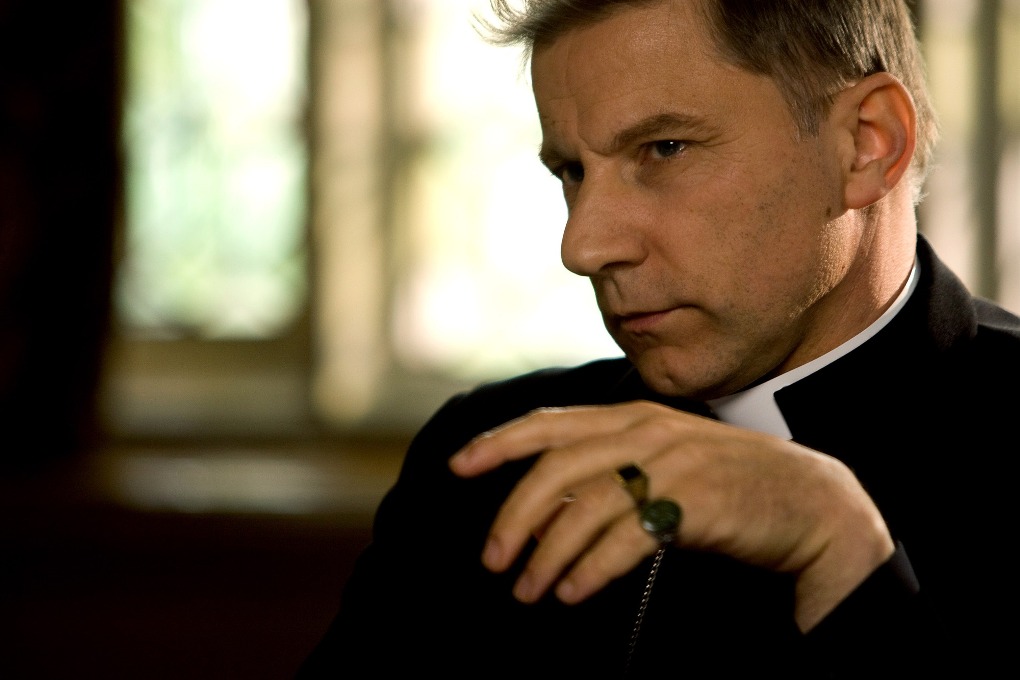 And yet the joke is that the church is empty apart from low-lifes and losers.
And yet the joke is that the church is empty apart from low-lifes and losers.
And it’s an old joke, not an original joke. The church is empty and none of us goes except we all live in a Christian society, even if we don't believe in God. These huge buildings which are everywhere are part of the fabric of our lives, even if we ignore them, even if we drive past them and don’t notice them, just in sheer terms of their square footage. People say that they are empty shells lying around, which a lot of the time they are. But clearly the Church of England still has a role in people's lives in all the major moments in their lives. When they are born a lot of people still get christened. When you’re married. And crucially when you die. When you get off the road map, when you don't know what to do any more, people find themselves going there. So the vicars are still at the heart of our society.
Or the joke about school.
Of course. The joke is that they are exposed to the worst side of people because they get people who aren’t religious who want to use it for a wedding, who want to use it for a nice theatrical set to their happy day in an essentially materialistic event in which people are showing off their wealth to each other. They hire the church. Vicars we spoke to resent that.
They like funerals because they can do something, because people are broken and frightened and don't know what to do with themselves and that’s a moment where there’s real consolation and compassion and they feel that’s a relatively fulfilling moment for many of the people we spoke to. But clearly you’re dealing with people who are trying to get something out of you: want the church, want the church school, want to be forgiven for their appalling behaviour, want to feel better about themselves even though their lives are completely unmanageable - they’ve been unfaithful or they’ve done something which is torturing them.
Vicars are often outsiders. Their predicament is fascinating
You’re there constantly to minister to the trouble that they’ve got into probably because of their own stupidity or corruption. So you’re exposed to the arse-end of people a lot of the time, and you have to be the one person who can’t say, “Please go away, I’ve got something better to do,” to people who are a complete pain in the arse, people who have been rejected by every other institution, like their job, their marriage, the mental hospital. Once all of those have gone, the vicar says, “Hi, come and sit next to me on the bench.”
Let me just finally say, the vicars are often outsiders. Their predicament is fascinating. They are at the heart of our culture and yet they are often quite sensitive outsiders themselves, certainly in my experience. They don't quite know how to live and so they are sort of the right people to shepherd those who also find everything hard. I think it’s a nice thing.
REV: THE GOOD NEWS (SERIES TWO)
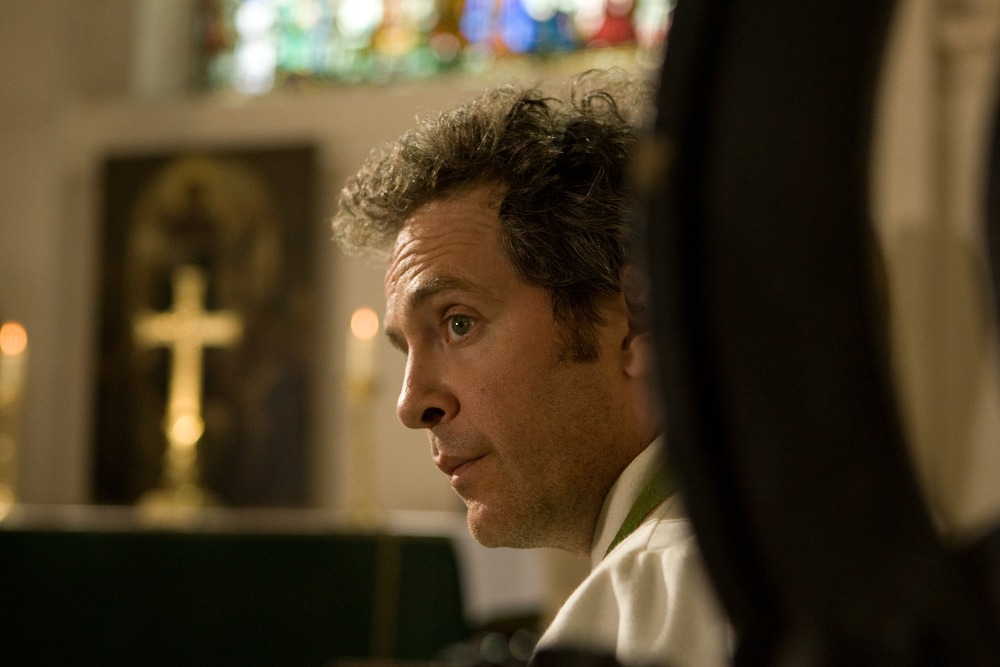 Why does Rev work? It shouldn’t. No one cares about the church any more.
Why does Rev work? It shouldn’t. No one cares about the church any more.
Do they not? I think they think they don't but actually they do, because there’s a bit of all of us that yearns for something greater than ourselves and the tawdry nature of our own materialistic existences, particularly now we’re in a recession and none of us are getting the lift that we used to get off shopping. We just associate money with anxiety, so inevitably your mind tends to other things. It might just tend to a complete blank but spiritual things are going, “Hi, hello, we’re over here as a possible replacement.” I’m not saying we’re all Christian. Adam himself is searching. It’s an aspiration rather than a conviction.
So that would be one answer. The other answer is I think it’s just luck. Having been acting for 20 years, this one’s just come up, it’s got a green wave on the Euston Road. It’s some confluence of chemistry about it. The characters work. The stories work, you could say we’re in straitened times and it’s fundamentally good-natured, it doesn’t have the muscularity of more satirical angry Nineties cock-waving show. It’s not like that. It’s compassionate.
The Vicar of Dibley went on for a long time. Obviously there was Father Ted. You could say that we are merely a reinvention of something that’s a standard fixture in our cultural life which is a vicar comedy, but we are the latest version of it in which the vicar is not fundamentally ridiculous himself. And that’s what’s apparently refreshing about it for people in the church. The predicament of the vicar’s life is ridiculous and full of comedy but you are fundamentally going with it. And maybe that’s about the time and what’s needed for the time.
It’s about failure. Failure is sort of easily liked. People dig failure in the UK for some reason
Dibley was good-natured. She was the heroine. But it was set in the land of Beatrix Potter. I suspect at the beginning it was probably very on-the-button. It was the female cleric taking over, the revolutionary going into the land of the Home Counties. But at the end, as these things become, it was more cosy than that. I’m not being anti Vicar of Dibley, I’m trying to define it in relation [to Rev]. Ours is urban, multicultural, very contemporary and it’s about failure. Failure is sort of easily liked. People dig failure in the UK for some reason in a way that I don’t think they do in the States for instance. But we are all quite reassured by a hopeless character. Only Fools and Horses is about failure, isn’t it? Perhaps lots of comedies are. I’m now making this up. Dad’s Army is about failure: they are all shit but they’re trying to do something heroic.
Which of these sitcoms are in your pantheon?
Dad’s Army - I did enjoy that. James and I thought about that when we were trying to think of characters. You’ve got to love all the characters. And I have to say another simple answer, without aspiring to make great statements, is that it’s got really good actors in it. The regulars are all terrific and could all have their own show in their own right. Olivia Colman (pictured below) is extremely gifted. And Simon McBurney and Steve Evets. Just simply on strike rate, good jokes, very good performances, recognisable world that looks believable and plausible, it’s contemporary. What’s not to like? It should work, I suppose, on paper.
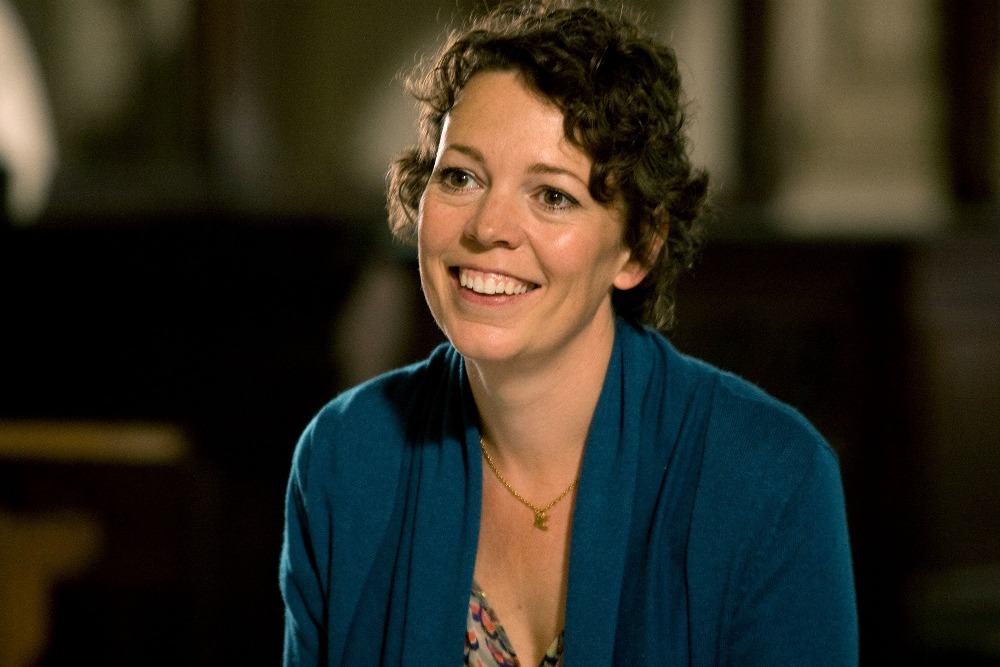 Is it easy to identify with Adam Smallbone because he is grappling with faith, much as we as a middle-class sitcom-watching nation are?
Is it easy to identify with Adam Smallbone because he is grappling with faith, much as we as a middle-class sitcom-watching nation are?
Yes, though that’s only part of the audience. The chemistry of it is weird and I do say it’s like a green wave because there is a woman who lives here [in west London]. I’ve only seen that rectangle around her eyes. She’s called Goldie and she is from Somalia and has been here 18 years. So she has none of the cultural baggage that you bring to the show and yet she loves it. How is that? I think the demographic is quite broad.
Apparently the Archbishop of Canterbury is a fan.
I doubt he’s actually watching it rubbing his tummy in bed at night going, “This is rather good.” He’s probably got other things on his mind. I know he liked episode six (he said as if referring to St Mark’s gospel). It was a story in which the vicar got very drunk and had a crisis of faith, got pissed, told his wife to fuck off and ended up giving someone the last rites, and that somehow sobered him up and it was touching. It was a non-comedy ending but there was lots of high comedy in it as well. That one seems to strike a chord with people.
I think managing the rites of death, having asked vicars about it, is one of the areas where vicars feel head-and-shoulders they are providing a service no one else can. And frankly, if I think of the worst possible events, I’d rather talk to an enlightened sensitive priest about it than a doctor or a solicitor.
There is a range of performance styles and tones in there from as authentic as you like to comically grotesque and exaggerated
It is a strange accolade to a comedy about the church’s failings or its waning influence or tenuous hold in modern society that the Archbishop would wish to give his benediction.
I imagine somebody went, “Archbishop, we probably ought to have something to say about this. I know Africa’s about to secede from the Church of England and you’ve just been pilloried about this and the Opposition have just accused you of that but can you say something about Rev? How about, ‘I think it’s rather good’? We don’t want to piss them off.” The slightly serious answer is we’re not keen to become co-opted into the Church of England’s mouthpiece. Not that we are. I think they just thought its heart was in the right place. And frankly those relationships that we’ve formed with certain vicars underpin the whole thing. We run the scripts past them to keep it authentic. They’ve given us some very useful steers. The show is a researched show. When James and I have gone off on our little research adventures, it’s felt like a journalistic venture at that point. That’s probably what’s given it its identity. That’s why people in the church like it because they believe it to be real. Although I have to say in the second series our stories have become more invented because in terms of the daily life of church bureaucracy and keeping the roof on and the evangelical crisis we’ve covered a lot of the big topics in the first one so the second one we’ve gone into the lives of the characters a bit more and we’ve invented stuff.
Is there less research in this?
We did probably more formal research in a way for slightly less return. Following up on ideas that we had. We spent a weekend at the Greenbelt festival because we’d been asked to it. So a lot of the time it involved responding positively to invitations that we’d had and thinking, we’ll go and have a look and learn more about how this world works.
Were people trying to sneak stuff into the script?
People are certainly forthcoming with stories. They think in narratives because they tell them all the time as part of the liturgy and also it’s quite a theatrical thing to do so they are all quite savvy. We asked them explicitly. We met about 20 vicars in a round-table forum in Salisbury last September and we asked them, “What did you like about the first series, what did you not like, are there huge gaps there, what areas have we failed to cover that are staring us in the face, what would you like to see?”
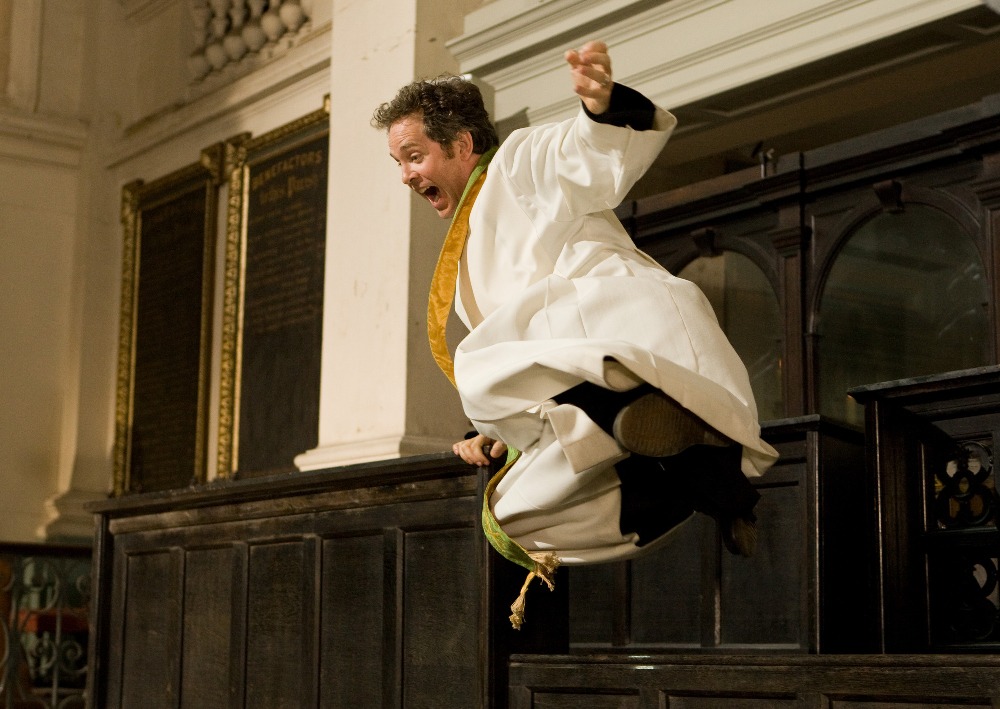 What came out of that?
What came out of that?
There’s always someone who finds the archdeacon implausible. And often an archdeacon. But there are also people who have said, “Did you base it on my archdeacon? I couldn’t believe it.” The character with the most licence is the archdeacon. But he’s also an absolutely glorious creation so you wouldn’t want to change it. But there is a range of performance styles and tones in there from as authentic as you like to comically grotesque and exaggerated. So the most useful stuff to come out of it was about church hierarchy and ambition and how you get promoted. We went more into the life of the school and the life of faith. I was keen after the first series that we should try and go into what Adam actually believes in. A lot of people had said, “I’m not sure he actually believes in God.” So we said, “OK, let’s try and get under the skin of that.” Difficult to do. The Ecstasy thing [Adam is furtively fed Ecstasy by Colin in episode two] came out of whenever I asked vicars, “What does it feel like to believe in God?” In most cases they started talking in very wafty abstract ways. I thought, wow, I only hear people talking like that when they have taken hallucinogenics. (Pictured above: Adam on Ecstasy.)
What about Adam’s entertaining crush on the headmistress of the C of E school?
It’s still there but it’s hard to know where to go with it unless they actually run off with each other. She wasn’t interested so we tried to reverse the joke, so rather than him hitting on her it’s her comically hitting on him. So she’s goes, “Oh, are you asking me out to dinner?” So he has to go, “No, no, I’m not.” “Do you like my dress?” “No, no.”
Is he going to have kids?
My fan Goldie said, “Why is the wife so edgy? She wants to have a baby, innit.” Goldie felt as proprietorial of the show as any number of clerics. The second time I saw her we had a long chat about storylines. She told me what she wanted to see as a fan. I told her, “We’re all over it, Goldie.”
Are you on for doing another one?
As long as the scripts continue to be as good as they were and have been. A lot of work goes into those scripts and whether we’re up for putting all that work in – it takes the whole year. I haven’t really done or thought about anything else. The only thing that suffers is my acting. I’ve noticed the ones I act in best in both series are the ones in which I’ve had the least to do with in terms of the script. Each time we’ve got in another writer to do one episode because it’s too much to do my acting seems to be best in that. It’s five per cent but the difference between really good and mediocre is five per cent, generally in life. Luckily, because I’m in the edit, I’m able to go, “I’m sure there’s one where I’m better than that.” At the moment I’m thinking, what is going to come along that would be more interesting than this? It’s going to have to be very special.
It feels like a very good fit.
I wouldn’t want it to become all there ever was. That’s the problem. The danger with playing a part that defines you is that it swallows up everything else. It may be that I’ve got to the point in my life as an actor where if I’m on form I’m the best I’ve ever been. I’m 44. I’m obviously keen to discover that my career is not only Rev.
- Rev is on BBC Two for seven weeks from 9pm on Thursday
Explore topics
Share this article
The future of Arts Journalism
You can stop theartsdesk.com closing!
We urgently need financing to survive. Our fundraising drive has thus far raised £49,000 but we need to reach £100,000 or we will be forced to close. Please contribute here: https://gofund.me/c3f6033d
And if you can forward this information to anyone who might assist, we’d be grateful.

Subscribe to theartsdesk.com
Thank you for continuing to read our work on theartsdesk.com. For unlimited access to every article in its entirety, including our archive of more than 15,000 pieces, we're asking for £5 per month or £40 per year. We feel it's a very good deal, and hope you do too.
To take a subscription now simply click here.
And if you're looking for that extra gift for a friend or family member, why not treat them to a theartsdesk.com gift subscription?
more TV
 Down Cemetery Road, Apple TV review - wit, grit and a twisty plot, plus Emma Thompson on top form
Mick Herron's female private investigator gets a stellar adaptation
Down Cemetery Road, Apple TV review - wit, grit and a twisty plot, plus Emma Thompson on top form
Mick Herron's female private investigator gets a stellar adaptation
 theartsdesk Q&A: director Stefano Sollima on the relevance of true crime story 'The Monster of Florence'
The director of hit TV series 'Gomorrah' examines another dark dimension of Italian culture
theartsdesk Q&A: director Stefano Sollima on the relevance of true crime story 'The Monster of Florence'
The director of hit TV series 'Gomorrah' examines another dark dimension of Italian culture
 The Monster of Florence, Netflix review - dramatisation of notorious Italian serial killer mystery
Director Stefano Sollima's four-parter makes gruelling viewing
The Monster of Florence, Netflix review - dramatisation of notorious Italian serial killer mystery
Director Stefano Sollima's four-parter makes gruelling viewing
 The Diplomat, Season 3, Netflix review - Ambassador Kate Wyler becomes America's Second Lady
Soapy transatlantic political drama keeps the Special Relationship alive
The Diplomat, Season 3, Netflix review - Ambassador Kate Wyler becomes America's Second Lady
Soapy transatlantic political drama keeps the Special Relationship alive
 The Perfect Neighbor, Netflix review - Florida found-footage documentary is a harrowing watch
Sundance winner chronicles a death that should have been prevented
The Perfect Neighbor, Netflix review - Florida found-footage documentary is a harrowing watch
Sundance winner chronicles a death that should have been prevented
 Murder Before Evensong, Acorn TV review - death comes to the picturesque village of Champton
The Rev Richard Coles's sleuthing cleric hits the screen
Murder Before Evensong, Acorn TV review - death comes to the picturesque village of Champton
The Rev Richard Coles's sleuthing cleric hits the screen
 Black Rabbit, Netflix review - grime and punishment in New York City
Jude Law and Jason Bateman tread the thin line between love and hate
Black Rabbit, Netflix review - grime and punishment in New York City
Jude Law and Jason Bateman tread the thin line between love and hate
 The Hack, ITV review - plodding anatomy of twin UK scandals
Jack Thorne's skill can't disguise the bagginess of his double-headed material
The Hack, ITV review - plodding anatomy of twin UK scandals
Jack Thorne's skill can't disguise the bagginess of his double-headed material
 Slow Horses, Series 5, Apple TV+ review - terror, trauma and impeccable comic timing
Jackson Lamb's band of MI5 misfits continues to fascinate and amuse
Slow Horses, Series 5, Apple TV+ review - terror, trauma and impeccable comic timing
Jackson Lamb's band of MI5 misfits continues to fascinate and amuse
 Coldwater, ITV1 review - horror and black comedy in the Highlands
Superb cast lights up David Ireland's cunning thriller
Coldwater, ITV1 review - horror and black comedy in the Highlands
Superb cast lights up David Ireland's cunning thriller
 Blu-ray: The Sweeney - Series One
Influential and entertaining 1970s police drama, handsomely restored
Blu-ray: The Sweeney - Series One
Influential and entertaining 1970s police drama, handsomely restored
 I Fought the Law, ITVX review - how an 800-year-old law was challenged and changed
Sheridan Smith's raw performance dominates ITV's new docudrama about injustice
I Fought the Law, ITVX review - how an 800-year-old law was challenged and changed
Sheridan Smith's raw performance dominates ITV's new docudrama about injustice

Add comment